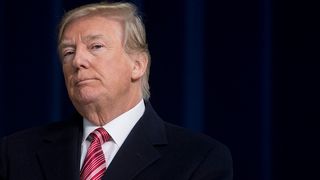During the 2016 US presidential campaign, people around the world were regularly reassured by election experts that Donald Trump was too outrageous to be elected president.
Reflecting this conventional wisdom, Hilary Clinton campaign’s central message seemed to be: “seriously?”.
In other words, we were constantly told that Trump was too offensive, ignorant and dangerous to be chosen to lead the US. But this political interpretation tended to miss how American popular culture had created the conditions for a character like Trump to upend the mannered and formulaic presidential selection process.
In many ways, the Trump campaign was politics catching up with popular culture.
Trump’s embrace of the worst parts of pop culture
In my new book, Anti-Americanism and American Exceptionalism, I argue that it is a mistake to see Trump as unique or his success as something that could only occur in America.
Trump-like behaviour is all around us. His narcissism, bullying, misogyny, racism, populism and tendency to play the victim is all too commonplace – and these are certainly not just American problems.
Trump snubbed the pretentiousness and faux politeness of the US political system with a devil-may-care attitude, and in so doing made presidential politics more like Westminster parliamentary politics with its name-calling and bravado.
What is exceptional is that American politics tends to be more pretentious and has a greater sense of self-importance than politics elsewhere.
Trump snubbed the pretentiousness and faux politeness of the US political system with a devil-may-care attitude, and in so doing made presidential politics more like Westminster parliamentary politics with its name-calling and bravado.
Trump has also taken the worst lessons from popular culture and used them to his advantage.
He turned the second presidential debate, for instance, into a version of The Jerry Springer Show by inviting three women who had accused Bill Clinton of sexual assault to sit in the audience.
Over 4,000 episodes, Springer had used traumatic cases like these to entertain and distract daytime television viewers. This is far from just an American ploy as radio shock-jocks like Alan Jones in Australia are well-practised at using victims for their own purposes.
In the wake of the Access Hollywood tapes, Trump drew from Springer’s playbook and turned one of the most important testing grounds in American politics into a crass reality television drama. By inviting Clinton’s accusers, his intention was to make this claim: Hillary’s husband is worse than I am.
Hardly caring to answer the serious questions posed during the debate, Trump also ventured that Hillary Clinton “would be in jail” if he was president, echoing the notorious “lock her up” chants at his rallies.
This mocking campaign style – which has continued throughout his presidency – has had real and grave consequences. However, it was far more in touch with the spirit of the times than is usually admitted.
A symptom of widespread cultural malaise
Trump’s constant self-promotion and trolling of opponents is not only utterly familiar, it’s emblematic of narcissistic 21st century culture. He is certainly more culturally familiar than Hillary Clinton with her lifelong dedication to public service and understanding of complex public policy issues.
The Trump phenomenon is politics subsumed by popular culture. During the 2016 campaign, he lived by the entertainment industry maxim that you can get away with almost anything as long as you’re not boring.
Part of the media’s watchdog role relies on accountability, ethics and the law being central to politics. However, this understanding is undermined when politics is reduced to a popularity contest and increasingly resembles the anything-goes ethos of popular culture.
With the next presidential election looming, it is time to take these popular but often insensitive cultural and political developments that helped Trump come to power very seriously.
If we view Trump as a product of popular culture, then he is clearly a symptom of a cultural malaise rather than a radical departure from it.
Given this, it has been intriguing to watch The New York Times, CNN and other traditional media outlets react with endless shock and horror to Trump, as if they had never seen anything like him.
One of the other many curiosities of the Trump era is that the oldest person ever to be elected US president quickly mastered the dark arts of Twitter and has strong appeal with a tech-savvy male youth subculture, which has made shock, conspiracies, misogyny, racism, trolling and bullying supposedly funny and transgressive.
New information technologies haven’t just fuelled greater understanding in the world – as some of the utopian founders of the internet had hoped – they have also given more power to the obnoxious and ill-informed.
Once you engage with this online culture, it is clear that Trump is part of a disturbingly widespread cultural backlash rather than being a unique phenomenon.
One sign of this is how much less critical Trump has been of white nationalists than any president in the post-civil rights era. By delaying and obfuscating his criticisms, he has encouraged those on the alt-right to believe their voices are being heard.
How we got to this sorry place is that the shock culture that pervades right-wing talk radio hosts, Fox News and 4Chan all made Trump’s alt-right presidency possible.
With the next presidential election looming, it is time to take these popular but often insensitive cultural and political developments that helped Trump come to power very seriously. These cultural trends are on the rise and require resistance as they degrade our personal lives and politics culture.






